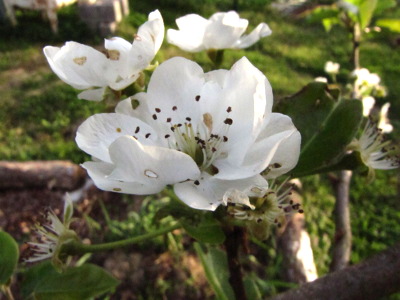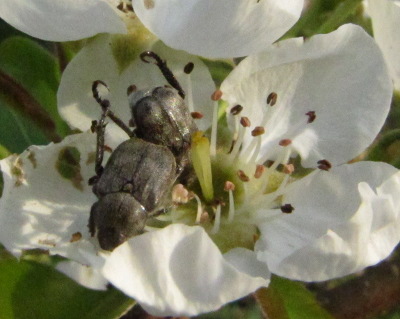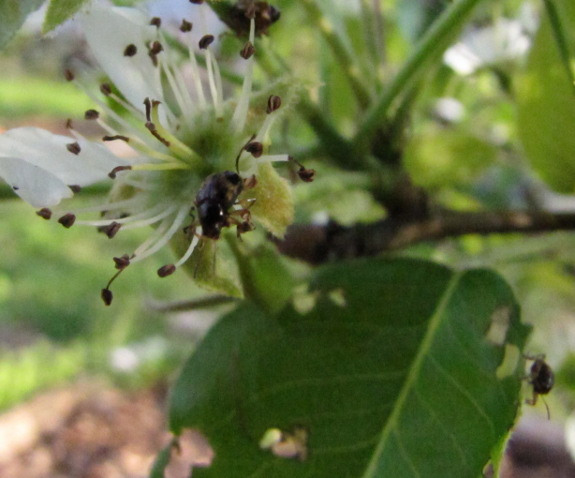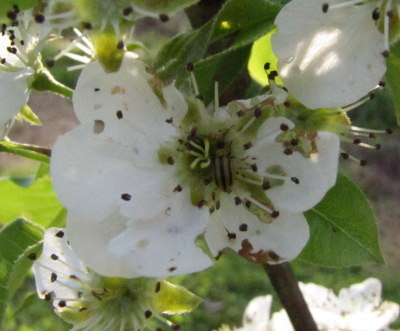
Pear pollination
 Last week, I mentioned that our
pear flowers were mostly being overlooked by pollinating bees, with all
of the buzz centering around the peaches instead. Since then, the peach
flowers began to decline and the pears opened more fully, which did
attract a few more bees to the pear blooms. But beetles were
still the primary pear pollinators.
Last week, I mentioned that our
pear flowers were mostly being overlooked by pollinating bees, with all
of the buzz centering around the peaches instead. Since then, the peach
flowers began to decline and the pears opened more fully, which did
attract a few more bees to the pear blooms. But beetles were
still the primary pear pollinators.
As with most of ecology,
the story is complex. It turns out that nectar has varying sugar
concentrations depending on the plant species, with one source listing
the following averages:
- Apple - 46.2%
- Peach - 28.9%
 Plum - 25.8%
Plum - 25.8%- Sour cherry - 23.5%
- Pear - 9% (with other sources listing 4% to 25%)
Of course, sugar
concentrations vary by variety as well, and are also affected by
weather. Low humidity leads to more sugar in nectar while high
humidity waters down the kool-aid.
But all else being
equal, you can see why a bee might prefer a peach flower to a pear
flower (and why lack of pollination is a problem in many pear
orchards). That said, pear flowers produce large quantities of
pollen, so honeybees rearing brood might spend time on there.

Beetles don't seem to
mind the lower sugar content of the pear blooms, perhaps because most beetles visit flowers primarily for pollen. Whatever the reason, I continued to see lots of
different kinds of beetles on my pear flowers, along with the holey
petals and leaves  that are the by-product of
these "mess and soil pollinators".
that are the by-product of
these "mess and soil pollinators".
Bugguide.net users
tentatively identified the beetles in my second photo as Hoplia (usually considered a pest
since it eats rose blossoms, but seemingly doing pollinating work here)
and those in the third as Paria. I didn't try to ask
for an ID on this last beetle because I couldn't zoom far enough in.
As a side note, I was
interested to read that fire blight bacteria are hindered by high sugar
concentrations in nectar, which is probably why pears are the most
frequent victims of the illness. Perhaps pear varieties resistant
to fire blight have sugar concentrations greater than the threshold 20
to 30%?
Want more in-depth information? Browse through our books.
Or explore more posts by date or by subject.
About us: Anna Hess and Mark Hamilton spent over a decade living self-sufficiently in the mountains of Virginia before moving north to start over from scratch in the foothills of Ohio. They've experimented with permaculture, no-till gardening, trailersteading, home-based microbusinesses and much more, writing about their adventures in both blogs and books.
Want to be notified when new comments are posted on this page? Click on the RSS button after you add a comment to subscribe to the comment feed, or simply check the box beside "email replies to me" while writing your comment.

Nice one. You are an example of a post-secondary education put to good use, IMHO, because you're living well in the world with your knowledge and skills, and also sharing with others. I just comment in this way because I'm preoccupied these days with what we should be learning (as adult learners, and what to teach kids) as we go forward into an uncertain future... I'm doing an organic farm intership this summer, and I'm all about the "practical learning" but you remind me that real knowledge and study matters, too. Do I need to go back to university, though? I think you guys are the rural, internet-savvy autodidact i.e. "the new black" when it comes to adult learning.
J --- I think that education is important for two reasons:
To teach you how to think critically
To learn how to look things up (and tell which sources are trustworthy)
You might get that in high school, college, or just in life. (And if you're not learning that in school, there's no reason to be there, in my opinion.)
After that, it just seems more efficient to learn on your own. That way, you can focus on the topics that really interest you. I started a master's a few years ago, but gave up on it because it wasn't focused on exactly what I wanted and I realized I'd rather spend my time reading and experimenting in a more focused manner!
Excellent philosophy, Anna. You're one of the few who has it figured out correctly. The purpose of formal education is not to teach you material per se, but to teach you how to learn and to think critically. Apprenticeships are for learning the details.
As for blossoms: we've had a very warm, early spring here- the blossoms on the pear & apple tree are unusually abundant, but 4 weeks early, and there's very few insects out and about yet. I'm wondering if the crop will actually be good or bad this year. Timing is everything.